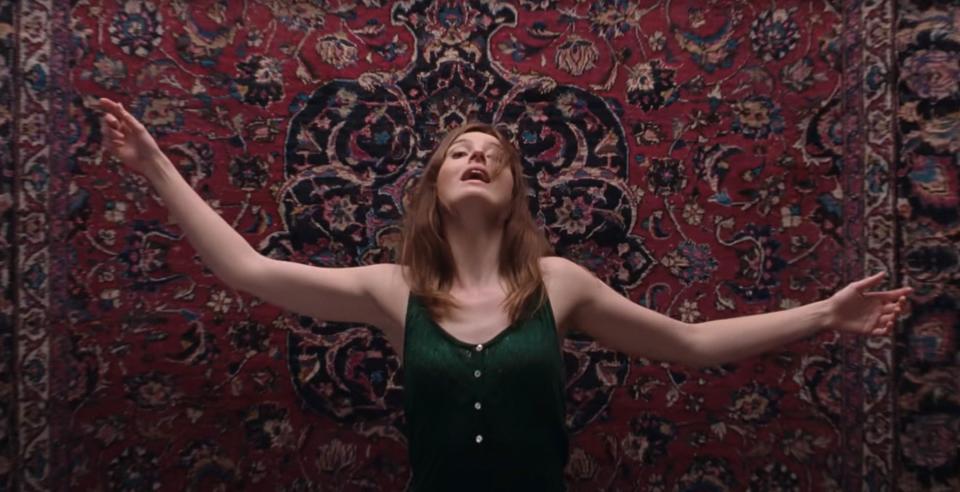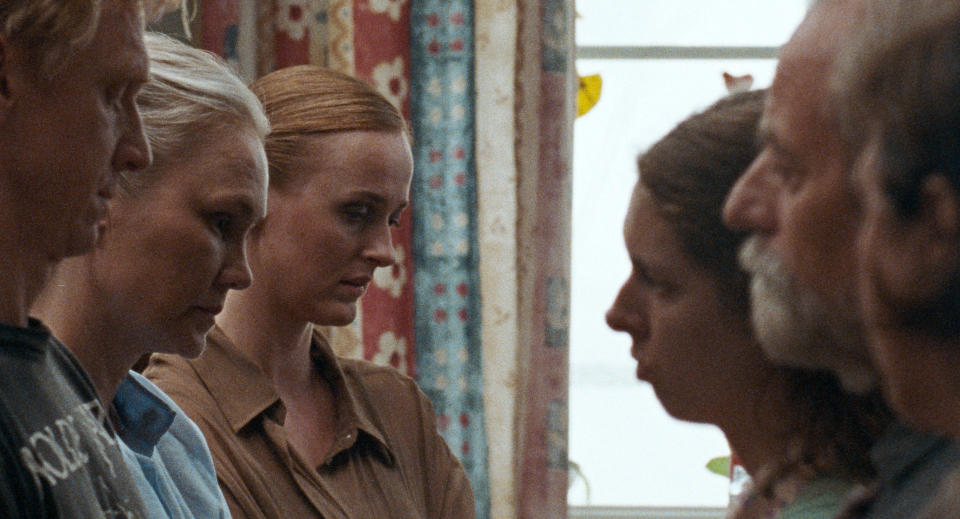Renate Reinsve On Her Return to Cannes With ‘Armand’, “The Hardest Thing I’ve Ever Done”

Before making Joachim Trier’s 2021 hit The Worst Person in the World, Renate Reinsve was about to jack it all in. Three years later — after A Different Man, with Sebastian Stan, Another Life, with Gael García Bernal, and Handling the Undead, a chiller from Let the Right One In writer John Ajvide Lindqvist — she now finds herself not just back in Cannes but doing double duty at the Sundance, Berlin and Tribeca film festivals (“It’s a running joke that I have two movies everywhere”). Reinsve takes the lead in the Swedish drama Armand, directed by Ingmar Bergman’s grandson Halfdan Ullmann T?ndel.
DEADLINE: What can you tell us about how you were cast in Armand?
More from Deadline
RENATE REINSVE: Halfdan, the director, approached me 10 years ago, and we did a short movie together. I think we did it in two days. Afterwards, we both stood there with tears in our eyes, because we’d had such a deep artistic connection. We knew we had to do something again, so he started to write this movie back then. I followed it through all his drafts. Eventually I became executive producer, because after everything exploded in my life after Cannes the last time, when I won the Best Actress Award, it became easier to get this movie financed. We finally got to do it last summer, and now we’ll see how it will be received. It’s going to be in Un Certain Regard, which is an amazing achievement for a debut movie.
DEADLINE: How would you describe it?
REINSVE: I haven’t actually seen it yet, because this movie, for me, was the hardest thing I’ve ever done. And I had to actually — I’m not exaggerating — lie down for two months afterwards. I got really, on another level, exhausted from this role.
DEADLINE: What happens?
REINSVE: The movie takes place in a school and it only takes place in a couple of hours. And what happens in the movie is that my character gets pulled into a parents’ meeting, because her son has done something horrible, but it’s not clear what’s going on. And the school is a little bit nervous to let this person into the meeting because she’s a very special person and she’s very hard to handle. But quickly within this meeting the school loses control. And with that, you start to dive into the psychology of all the characters that are in this classroom.
I really want to see it for the first time with an audience. I’ve never done that before. For me, it’s about the pain we carry within us that we inflict on others without us knowing. This character, she has so much fear and she has a very big need to control the people around her, but she has no insight. And it was so f*cking exhausting to play that.

DEADLINE: Why was it so exhausting?
REINSVE: I think that when you have so much pain and so much fear, you have an almost aggressive need to control your surroundings, not to lose control yourself. It’s so insanely difficult to do. Well, it’s impossible to do. You can’t control anything, but you try. And the people around her, they don’t know if she’s being sincere or if she’s being very, very manipulative. And for me to go between all these things, and play around with this kind of pain, was very, very hard.
DEADLINE: Is this your first time back in Cannes since The Worst Person in the World?
REINSVE: Yes, it is. Yeah.
DEADLINE: Audiences loved you in that film. Will they fall in love with this character as well?
REINSVE: I don’t think so [laughs]. It’s a very, very different character. I have very deep love for her, but it will be very exciting to see how she will be perceived, because I think she’s difficult to relate to. Maybe not to relate to, but she’s certainly difficult to communicate with. And I’m not sure if that’s going to come out in the movie.
DEADLINE: To go back to The Worst Person in the World, how big a deal was that film in your life?
REINSVE: It absolutely changed my life. It was also so unexpected. I remember doing a twirl on the red carpet because I thought, ‘I’ll never be here again. This will never happen again.’ So, I felt very silly afterwards. I remember coming out of the theater; we were in the car, and the reviews started ticking in — so many beautiful words about my work — and it really took off from there. I didn’t know how much it was going to affect my life. The next day I remember puking a lot, because I knew it was something very big, even though I couldn’t grasp the whole picture of it. But of course it’s fantastic to get recognition for something you worked very hard on.
DEADLINE: Did that success surprise you? As well as audiences, it’s even become a kind of a touchstone for aspiring filmmakers…
REINSVE: Well, when we were on set, I remember that everyone was so attached to the project. There was a big uprising of existential questions and a lot of big talks and a lot of love for the scenes. And everyone had a different — very different — but also very strong opinion about what the script was about. That kind of climate on set, how it felt there, has also been how the audience met the movie. So, it’s felt like a big kind of collective [reaction].
When we were on set, we felt we were making a film about important topics and important themes, and that big conversations would grow out of it. And that’s also what’s happened. I still meet people that say that their life changed from this movie and that they made big choices as a result. I did that too, after reading the script. I made some arrangements in my own life. So, it’s fantastic. That’s why you want to make a movie, that’s what you want to do when you make a movie. You want to find something true and something that’s important to you that you can share with other people. And if that grows outside the borders of the movie itself, that’s, of course, the best thing that can happen.

DEADLINE: Do you get recognized for it? And what kind of questions do people ask you about it?
REINSVE: I get recognized everywhere I travel. And I can see the difference between fans of this movie and my other movies. The people that come up and talk about this movie, they’re really kind and curious and want to share something about themselves. It’s all good. But yeah, a lot of people have seen it. I can feel it when I go around the world.
DEADLINE: Do you take your roles home with you?
REINSVE: That’s a very good question, a very good question. I’m having a lot of conversations with people I know about that, because I feel that I change a little bit right before I go into a shoot. You get into the zone and you don’t know the difference between you and the character. You fight so hard for their personality, their traits, and their battle for their own existence. Then I’ll see the movie later and I’ll disagree very much with this person’s choices.
I think you have to let yourself go into this psychosis of becoming [someone else]… I mean, I’ve been doing it since I was very young, in theater, too. I’ve actually been acting for 25 years, and I think a lot about the way you find the balance between letting go and staying yourself. But I guess I go very, very deep into the role. [Laughs.] Maybe a little bit too deep, since I had to lay down for two months after Armand. I think I just can’t stop and Halfdan, he can’t stop either. So, the next time we work together, we’re planning to have a third person there who will stop us. Because we cannot stop!
DEADLINE: You very nearly gave up acting to do carpentry instead. Does that decision haunt you?
REINSVE: No, it doesn’t haunt me now. But at the time, I wanted to go into movies, and I’d been working in theater for so long. Theater is very hard for the body and you get no money! I wanted to do something else. I think now that I am so incredibly lucky. I can choose the projects that give me that joy and energy that I didn’t get from the projects before. I wanted to give up because it wasn’t really giving me anything anymore. The projects I did in TV, they were just not for me. They were for someone else. I have respect for people who want to do it that way, but I needed to get into the movies. Quirky, dark, existential movies.

DEADLINE: Is it true that you’re reuniting with Joachim for another movie, Sentimental Value?
REINSVE: Oh, we’re starting to shoot in the middle of August. I don’t know if I can tell you what the movie is about actually. I think I can say that it’s about a relationship between a father and a daughter. I’ve read the script, and I cried. I am very excited about it. Joachim and Eskil [Vogt] have written a beautiful script, and he’s re-teaming with Kasper Tuxen, the cinematographer. He is, of course, a genius too. A lot of the same team is coming together to do this movie. It’s a different story, but it has some parallels to The Worst Person in the World.
DEADLINE: You sound pretty happy. Do you think you are living your best life at the moment?
REINSVE: I guess so. I’m actually very happy. But it takes a little bit of effort to be happy in this life too, to keep your feet on the ground and do normal stuff. Like, to be in my garden and pluck the weeds and just do normal stuff, that’s very important to me. The balance between the movie life and the very down-to-earth life is important. But I’m very happy.
Best of Deadline
Sign up for Deadline's Newsletter. For the latest news, follow us on Facebook, Twitter, and Instagram.
Solve the daily Crossword

